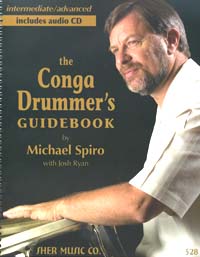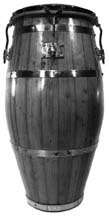Conga Drummer's Guidebook
 by
Michael Spiro by
Michael Spiro
review by Eric Stuer, Dec 2006
We found out about Michael Spiro approximately ten years ago when
he came through the Guitar Center in Dallas with David Garibaldi
and Jesus Diaz, the trio known as Talking Drums. Upon watching him
play for 45 seconds, it was already obvious that here was a guy
who knew the real secrets to making the conga drum speak with the
ancient voices..never mind that his left foot, seemingly unattended,
was nailing clave with a Gajate pedal the whole time; it was the
way that he phrased, the exact sounds and spaces in time that he
chose, that said he was one of those who KNEW..he sounded a thousand
years old.
Mr.Spiro's studies include a long time student/teacher association
with Fransisco
Aguabella , and study with Changuito and a long list of other
illustrious master drummers. He has traveled extensively to Cuba
and South America, and he is fortunate to be based in the San Fransisco
Bay area, home to some of the best percussion teachers and players,
within an elite group of which he is wholeheartedly accepted...
So it comes as no surprise to us that this is no ordinary conga
book.
 As
promised in the preface, the book contains a little of everything.
It is for intermediate and advanced students, and uses standard
music notation throughout; Michael spends time talking about the
art of reconciling the actual FEEL of Afro-Caribbean music with
what is normally written on paper. He uses ties to indicate the
true phrasing, which seldom starts or ends at the beginning of a
written measure. As
promised in the preface, the book contains a little of everything.
It is for intermediate and advanced students, and uses standard
music notation throughout; Michael spends time talking about the
art of reconciling the actual FEEL of Afro-Caribbean music with
what is normally written on paper. He uses ties to indicate the
true phrasing, which seldom starts or ends at the beginning of a
written measure.
He also accounts for the slight shift in time we often find in
these musics, a 'swing', of sorts, where the rhythm actually falls
between 3 and 4. Without the ability to play this way, one is doomed
to play stiffly, with an 'accent', as it were. ..he calls the adjustment
'fix', as in halfway between four and six, and he includes examples
to develop the sense of it.
The section on clave is one of the best I have seen so far.
There are plenty of exercises to develop the heel toe [or palm/tip]
'Mano Secreto' technique so thoroughly developed by Changuito and
his students..(All due respect to Tata
Guines, who paved the way for Changuito's work.) Included are
excersises for stamina and agility.
An interesting approach to improvisation appears in the book, using
the concept of Rhythmic 'cells' or patterns that over and over form
the building blocks of improvisation; when revoicing is applied
to these permutations, infinite variety becomes possible. There
are revoicing exercises included...
There is a great section on 12/8, including some crucial cell
coordination excercises against the short bell part I wish I had
seen and wrestled with 30 years ago. Time now to do so. He stresses
the need to be able to truly hear and feel the 12/8 figures as four
groups of triplets, instead of as a waltz, and to be able
to tap one's feet in four while playing these various rhythmic
cells against the short bell part, one in each limb. Mr. Spiro also
pays serious attention to the middle triplet, the more subtle and
difficult one so important to Afro-Caribbean music. Listen
to a three minute exercise , in mp3 format, running
the 12/8 rhythmic cells (common possibilities)against the short
bell part, from the CD.
I have not managed to mention everything in the book, by any means..Suffice
it to say here that it is now a classic work for
the conga drum (tumbadora) . As Rebecca Mauleon wrote, the 12/8
coordination exercises alone are worth the price of the book. The
Conga Drummer's Guidebook can be purchased directly from Sher
Music Co.
|

